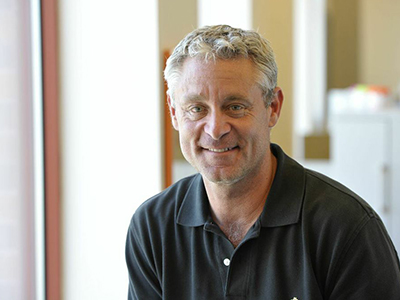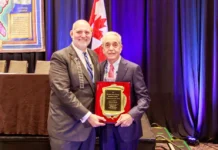When Ed Mitzen, Syracuse University ’89, was filling out his college application some 35 years ago, he had one goal in mind—getting into medical school. That all changed after high school graduation, when his father unexpectedly died.
The death of his father, a biochemist, left Mitzen feeling adrift, but not without acquiring a taste for science. He decided to major in biology in the College of Arts and Sciences (A&S).
“I struggled to keep a 2.8 GPA,” admits Mitzen, owner of a health care marketing agency in Saratoga Springs, New York, called Fingerpaint. “I knew I wouldn’t become a doctor.”
The rigors of undergraduate research, combined with a sense of civic responsibility gained from presiding over the Pi Chapter of the Psi Upsilon fraternity, ignited Mitzen’s entrepreneurial spirit. He worked as a pharmaceutical sales rep in Albany and a pharmaceutical product manager in Rochester, before earning an M.B.A. from the Simon Business School at the University of Rochester.
In 2006, the biopharmaceutical juggernaut Ventiv Health acquired Mitzen’s first company for $220 million, providing the seed money for Fingerpaint, which Mitzen opened in 2008.
Today, almost everything he touches reflects an unwavering commitment to “family, employees and philanthropy.” For instance, Ed and his wife, Lisa, regularly volunteer at Code Blue Saratoga, a temporary homeless shelter, located in a church basement near his office.
In February 2017, the couple made headlines by offering to pay for the construction of a permanent Code Blue shelter.
“Lisa and I have gotten to know many of the [shelter’s] guests. Some of them deal with mental health or substance abuse issues,” says Mitzen, Saratoga Living magazine’s “2018 Person of the Year.” “Most of them can’t catch a break because they have lost their jobs, homes or families.”
Indeed, Mitzen, 51, is part of a new wave of socially conscious business leaders.
Bill McEllen, who runs Fingerpaint’s New York and New Jersey offices, marvels at how his boss fosters a happy, engaged work environment—from paying 100 percent of his employees’ health care, to contributing to their student loan repayment programs, to giving each of his 230 workers a four-week paid sabbatical every five years. “Ed is good about recognizing his employees’ successes,” he says, citing, as an example, the company’s recent 10-year anniversary—an all-expenses-paid, three-day celebration in Scottsdale, Arizona.
For Mitzen, “health and wellness” is not just business; it is a way of life. “Lisa and I have all that we need, including a loving family and a circle of good friends. I simply treat people the way I want to be treated,” he says.























